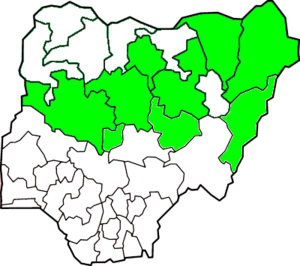African securityU.S. designates Nigeria’s Boko Haram a foreign terrorist group
The State Department on Wednesday designated the Nigerian Islamist group Boko Haram as a foreign terrorist organization. The designation makes it possible for the United States to freeze the assets of the organization and its leaders and members, impose travel bans on members of the group, and prohibit Americans from offering material support to the organization. The department also designated Ansaru, a Boko Haram splinter faction, as a foreign terrorist organization. The United States says the designation would help the Nigerian government in fighting the growing threat of domestic Islamist terrorism.

Nigerian states with Boko Haram activity (green) 2010 - 2013 // Source: commons.wikimedia.org
The State Department on Wednesday designated the Nigerian Islamist group Boko Haram as a foreign terrorist organization (FTO).
The designation makes it possible for the United States to freeze the assets of the organization and its leaders and members, impose travel bans on members of the group, and prohibit Americans from offering material support to the organization.
The New York Times reports that the department also designated Ansaru, a Boko Haram splinter faction, as a foreign terrorist organization.
The United States says the designation would help the Nigerian government in fighting the growing threat of domestic Islamist terrorism, but some Africa specialists argue that designating Boko Haram a terrorist organization is more likely to enhance the group’s reputation, both inside and outside Nigeria, and may help the group recruit jihadists.
Boko Haram has been particularly brutal in its tactics, targeting the Nigerian state and singling out government institutions, especially schools, for attack (the name of the group means “Against Western Education”).
The Times notes that in May, the Nigerian military has launched a scorched-earth counterinsurgency campaign against the group, which appeared to have halted its attacks in the urban centers of northeastern Nigeria. In rural areas the killings appear to be continuing unabated.
“The Nigerians have not helped themselves in this problem by often using extreme and brutal tactics,” Daniel Benjamin, the State Department’s former top counterterrorism official, told the Times.
“The U.S. has been engaging with the Nigerians to improve their counterterrorism practices. The hope is it’ll pay off.”
Gen. Carter F. Ham, then the head of the Pentagon’s Africa Command, said last December that members of Boko Haram had traveled to training camps in northern Mali – which was under Islamist rule until January this year — and had most likely received financing and explosives from the Qaeda franchise. “We have seen clear indications of collaboration among the organizations,” General Ham said at the time.
Boko Haram has also collaborated on training and tactics with other African Islamist groups, such as al-Shabaab in Somalia.
The Times reports that the decision to designate Boko Haram and Ansaru as foreign terrorist organizations followed a spirited debate inside and outside the government which was going on for months. Lawmakers, most of them Republicans, pressed the administration for the designation, but intelligence and military officials said that Boko Haram did not pose an immediate threat to the United States, and that if the group were designated as a terrorist group by the United States, it would have more of an incentive to attack Americans and American interests.
Many Africa and Nigeria scholars agreed with the U.S. intelligence community’s reluctance to designate the Nigerian groups as FTOs. The designation “would internationalize Boko Haram, legitimize abuses by Nigeria’s security services, limit the State Department’s latitude in shaping a long-term strategy and undermine the U.S. government’s ability to receive effective independent analysis from the region,” a group of twenty-five Africa and Nigeria specialists wrote in a letter sent last year to then-Secretary of State Hillary Rodham Clinton.
